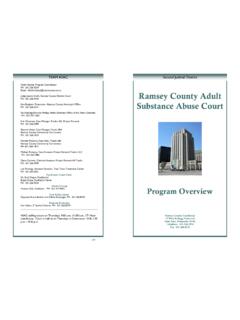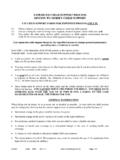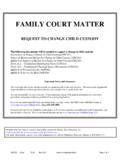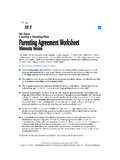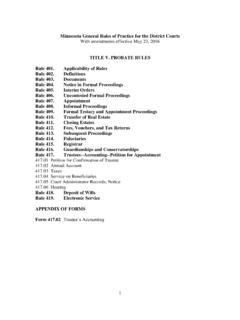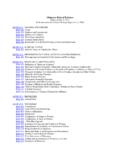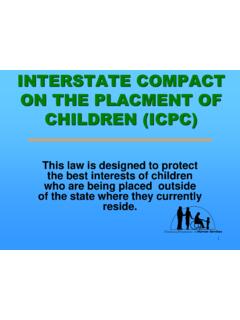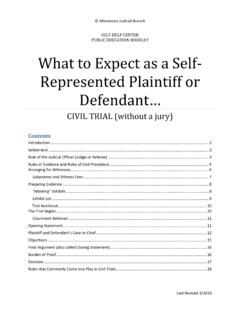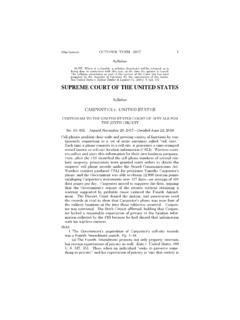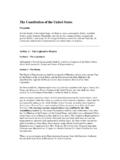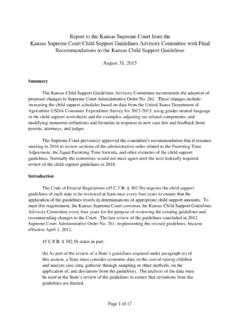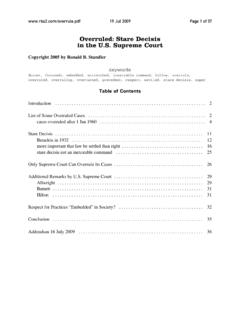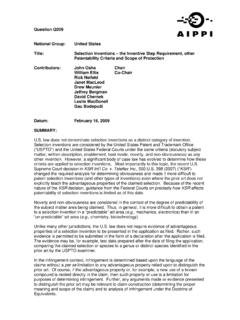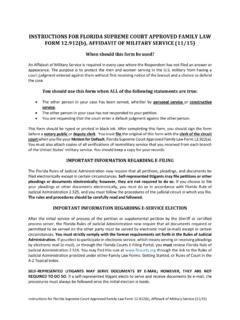Transcription of Minnesota General Rules of Practice for the District …
1 1 Minnesota General Rules of Practice for the District Courts with amendments effective July 1, 2015 TITLE VI. CONCILIATION court Rules Rule 501. Applicability of Rules Rule 502. Jurisdiction Rule 503. Computation of Time Rule 504. Judge(s); Administrator; Reporting Rule 505. Commencement of Action Rule 506. Fees; Affidavit in Lieu of Fees Rule 507. Statement of Claim and Counterclaim; Contents; Verification Rule 508. Summons; Trial Date Rule 509. Counterclaim Rule 510. Counterclaim in Excess of court 's Jurisdiction Rule 511. Notice of Settlement Rule 512. Trial Rule 513. Absolute or Conditional Costs; Filing of Orders Rule 514. Notice of Order for Judgment Rule 515. Entry of Judgment Rule 516. Costs and Disbursements Rule 517. Payment of Judgment Rule 518.
2 Docketing of Judgment in District court ; Enforcement Rule 519. Docketing of Judgment Payable in Installments Rule 520. Vacation of Judgment Order and Judgment 2 Rule 521. Removal (Appeal) to District court Rule 522. Pleadings in District court Rule 523. Procedure in District court Rule 524. Mandatory Costs in District court Rule 525. Appeal from District court APPENDIX OF FORMS Effective January 1, 2010, the following forms are deleted from these Rules and are maintained by State court Administration on the judicial branch website at : UCF-8 Statement of Claim and Summons UCF-9 Judgment and Notice of Judgment UCF-10 Defendant's Counterclaim and Notice of Hearing UCF-22 Financial Disclosure Form Affidavit of Service 3 RULE 501.
3 APPLICABILITY OF Rules Rules 501 through 525 apply to all conciliation court proceedings. RULE 502. JURISDICTION The conciliation court shall have jurisdiction and powers as prescribed by law. RULE 503. COMPUTATION OF TIME (a) General . All time periods shall be measured by starting to count on the first day after any event happens which by these Rules starts the running of a time period. The last day of the time period shall be included unless it is a Saturday, Sunday, legal holiday, or, when the act to be done is the filing of a document in court , a day on which weather or other conditions result in the closing of the office of the court administrator of the court where the action is pending, or where filing or service is either permitted or required to be made electronically, a day on which unavailability of the computer system used by the court for electronic filing and service makes it impossible to accomplish service or filing, in which event the period runs until the end of the next day that is not one of the aforementioned days.
4 (b) Time Periods Less Than Seven Days. When the time period is less than seven days, intermediate Saturdays, Sundays, and legal holidays shall be excluded from the computation. (c) Legal Holiday. For purposes of this rule, a legal holiday includes all state level judicial branch holidays established pursuant to law and any other day on which county offices in the county in which the conciliation court is held are closed pursuant to law or court order, and with respect to service or filing by Mail, a day that the United States Mail does not operate. (d) Additional Time if Service By Mail or Service Late in Day. Whenever a person has the right or is required to do an act within a prescribed period after the service of a notice or other document, and the notice or document is permitted to be and is served by U.
5 S. Mail, 3 days shall be added to the prescribed time period. If service is made by any means other than United States Mail and accomplished after 5:00 local Minnesota time, 1 additional day shall be added to the prescribed time period. (Amended effective July 1, 2015.) 4 1993 Committee Comment State level judicial branch holidays are defined in Minnesota Statutes, section , subdivision 5 (1990), which includes: New Year s Day, January 1; Martin Luther King s Birthday, the third Monday in January; Washington s and Lincoln s Birthday, the third Monday in February; Memorial Day, the last Monday in May; Independence Day, July 4; Labor Day, the first Monday in September; Veteran s Day, November 11; Thanksgiving Day, the fourth Thursday in November; and Christmas Day, December 25.
6 Section , subdivision 5, further provides that when New Year s Day, January 1; or Independence Day, July 4; or Veteran s Day, November 11; or Christmas Day, December 25; falls on Sunday, the following day shall be a holiday and that when New Year s Day, January 1; or Independence Day, July 4; or Veteran s Day, November 11; or Christmas Day, December 25; falls on Saturday, the preceding day shall be a holiday. Section , subdivision 5, also authorizes the judicial branch to designate certain other days as holidays. The 1992 Judicial Branch Personnel Plan designates the Friday after Thanksgiving as a holiday. Conciliation courts are housed in county buildings, and the county is authorized to close county offices on certain days pursuant to Minnesota Statutes, section (1990).
7 Thus, if a county closes its offices under section on a day that is not a state level judicial branch holiday, such as Christopher Columbus Day, the second Monday in October, the conciliation court in that county would nevertheless include that day as a holiday for the purpose of computing time under Rule 503. See Mittelstadt v. Breider, 286 Minn. 211, 175 191 (1970) (applying section to filing of notice of election contest with District court ). If a county does not close its offices on a day that is a state level judicial branch holiday, such as the Friday after Thanksgiving, the conciliation court in that county must still include that day as a holiday for the purpose of computing time under Rule 503.
8 Advisory Committee Comment 2009 Amendment Rule 503(c) is amended to clarify that for service or filing by mail, if U. S. Postal Service offices are closed on a particular day, that day is not deemed a working week day for the purpose of the rule, effectively permitting the mailing to be made on the next day that is a working week day. This change conforms the rule to the time calculation provision of Minn. R. Civ. P. , which in turn was amended in 2008 to conform the rule to the Minnesota Supreme court decision in Commandeur LLC v. Howard Hartry, Inc., 724 508 (Minn. 2006) (holding that where the last day of a time period occurred on Columbus Day, service by mail permitted by the Rules was timely if mailed on the following day on which mail service was available).
9 RULE 504. JUDGE(S); ADMINISTRATOR; REPORTING (a) Judges. The judge(s) and, where authorized by statute, full and part time judicial officers and referees of the District court shall serve as judge(s) of conciliation court for such periods and at such times as the judge(s) shall determine. A judge, judicial officer, or referee so serving shall be known as a conciliation judge. 5 (b) Administrator. (1) The court administrator shall manage the conciliation court , and may delegate a deputy or deputies to assist in performing the administrator s duties. The court administrator shall keep records and accounts and perform such duties as may be prescribed by the judge(s). The court administrator shall account for, and transmit to the appropriate official, all fees received as required by statute or rule.
10 (2) Under supervision of the conciliation court judges, the court administrator shall explain to litigants the procedures and functions of the conciliation court and shall on request assist litigants in filling out the forms provided under Rules 507(b) and 518(b) of these Rules and on request shall, to the extent technically feasible, forward properly completed statement of claim and counterclaim forms to the administrator of the appropriate conciliation court together with the applicable fees, if any. The court administrator shall also advise litigants of the availability of subpoenas to obtain witnesses and documents. The performance of these duties shall not constitute the Practice of law. (3) Unless personal service is required under these Rules , the court administrator may transmit notices by mail or by any means authorized by Rule 14 of the General Rules of Practice for the District Courts.
